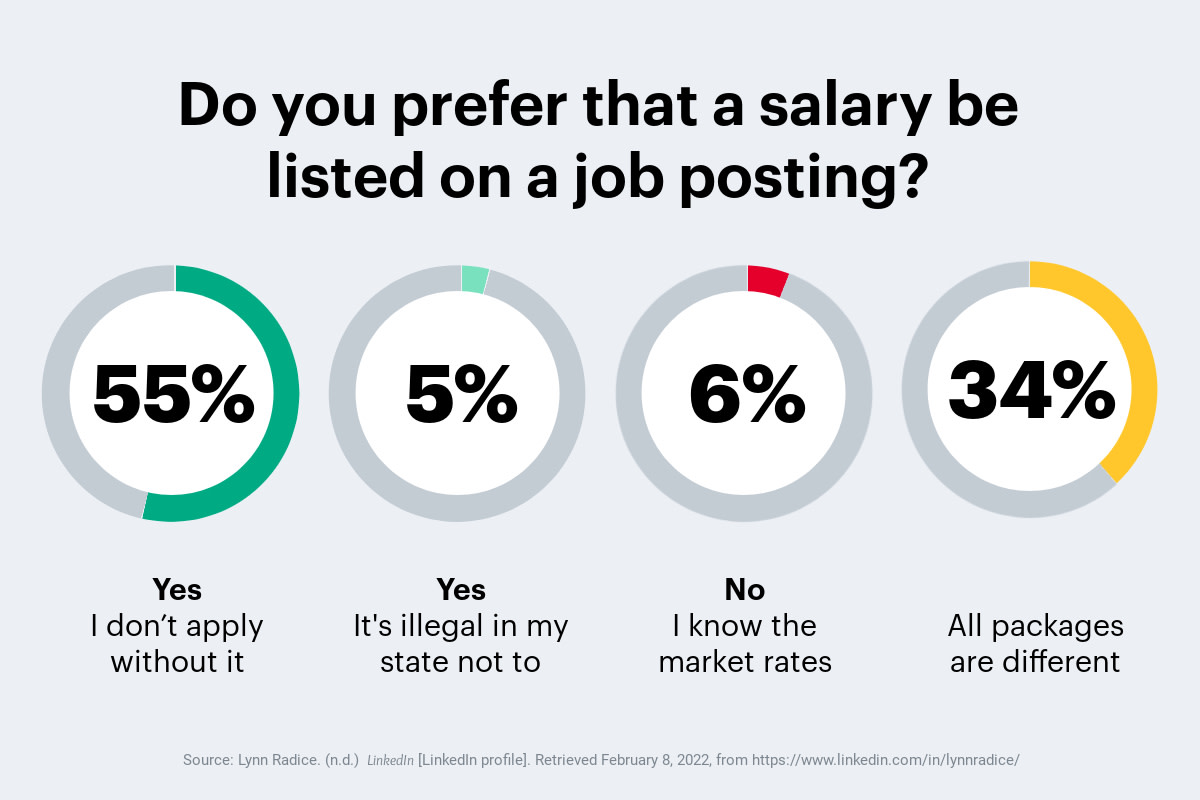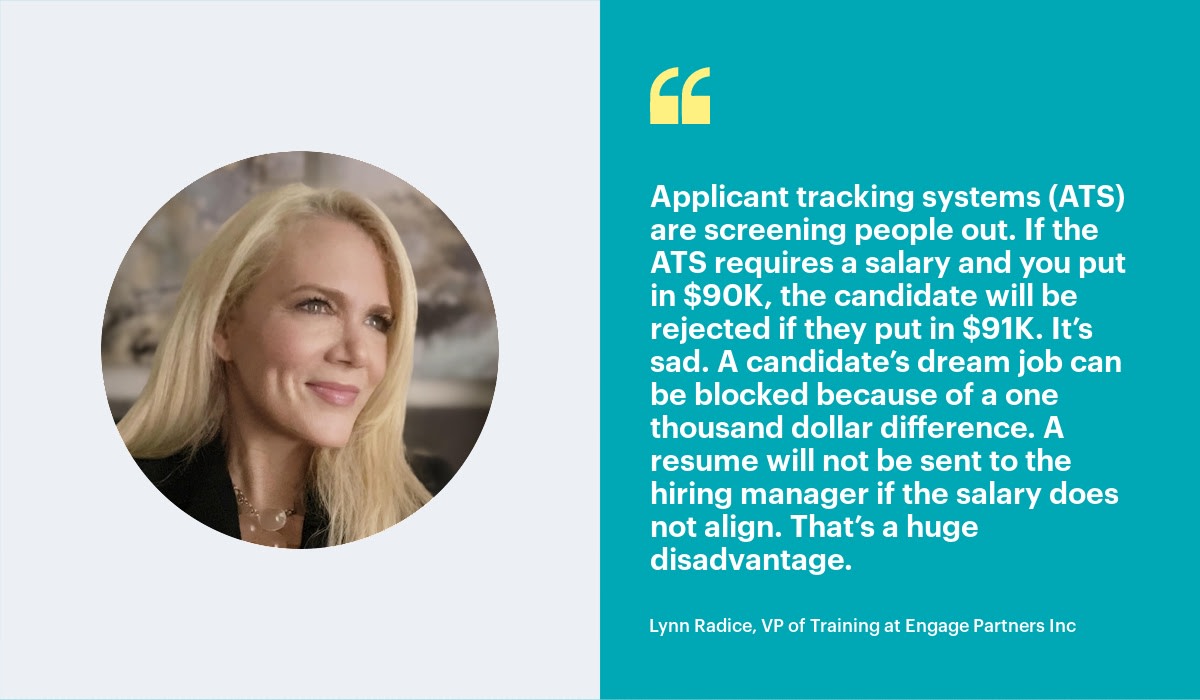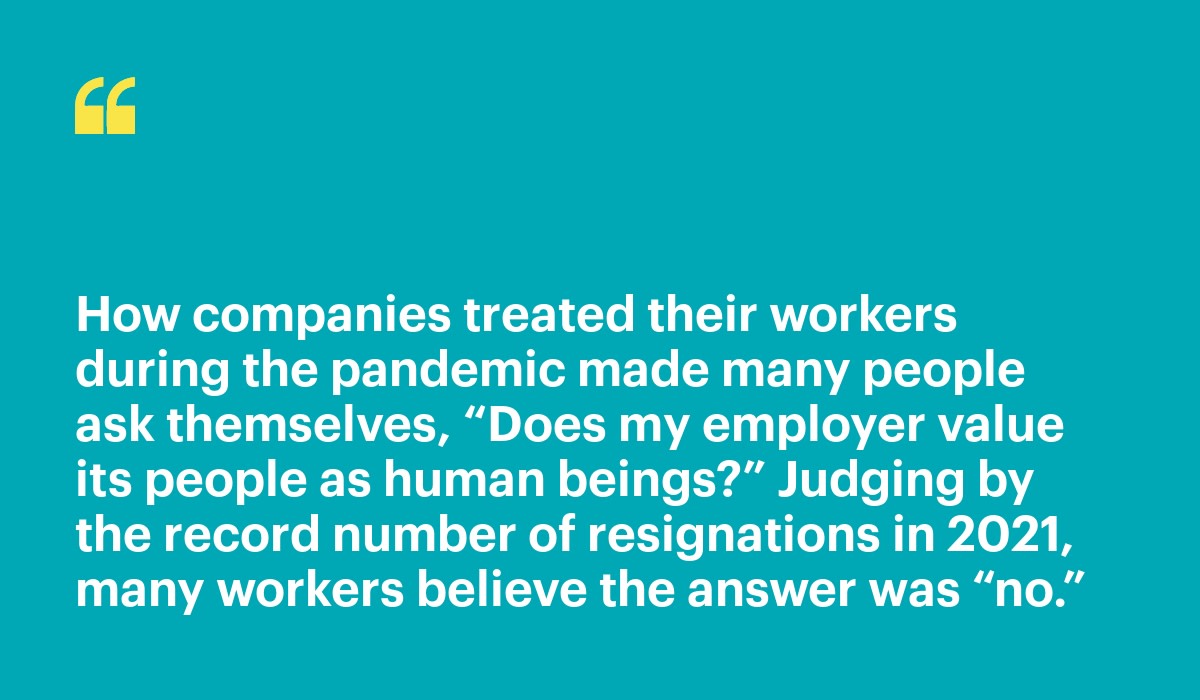Should salary ranges be included in job descriptions?
Should you include salary ranges with job postings? Is transparency the key to talent acquisition or does pay transparency limit your talent pool?

Imagine you’re scrolling for your next product manager job on LinkedIn and your search narrows to two listings: an unknown startup paying $150,000 per year that only matches some of your skills, and a well-established public corporation that matches most of your skills but doesn’t list the salary range. Which do you click on first? Which would you spend time applying for? In other words: How much of a motivating factor is pay transparency?
A new law in New York City requires employers to include salary ranges in job postings. Many praise the law as a necessary step in corporate transparency. Not only does it allow prospective employees visibility on what the company feels the position is worth, but it also allows job seekers more information on the current market value of roles. But there’s more to pay transparency than a position’s market value—a clearly-stated pay range can improve equity, too.
When one side has all the information, fair negotiation is impossible. I remember the bitter sting of betrayal when, early in my career, I discovered that a colleague was earning more than twice as much as I was for the exact same entry-level role. In my case, it turned out that the agency that hired me was actually subcontracting me through two other agencies, which collectively siphoned off 60% of my wages before I saw them. I felt robbed. The agency knew what I’d accepted as a wage for my previous placement, and knew what the new posting paid, and were able to leverage my ignorance and trust to swindle me. The experience left me jaded and cynical. I quit within a month or two of this discovery, and it is perhaps no coincidence that was the last time I ever contracted with a placement agency.

To learn more about the level of pay transparency job seekers and employees want, download our new report, Pay Transparency: Should salary be a secret?
Equal pay to support gender equality
Staunch defenders of the status quo are keen to victim blame when there’s a discrepancy between men and women, asserting that men deserve more pay because they negotiate for it, glossing over that women are often punished for the same behavior men are rewarded for. New research in the Journal of Applied Psychology suggests that backlash against women who behave assertively may be the bigger issue. Because companies are so secretive about salary (and those of us who are Gen X or older often have a taboo around discussing it), companies benefit from silence and can often get away with wildly disparate pay scales until an audit or a lawsuit brings unfairness to light. It’s not just internal discrepancies that have employers worried; if employees find out they can be making more money elsewhere for the same work, this may inspire them to jump ship.
Lynn Radice, VP of Training at Engage Partners Inc. is an AIRS certified Diversity Executive Recruiter and an advocate of equal pay for equal work at all levels. She is helping to mend the pay gaps globally by being a strategic business partner and asking critical questions. While Lynn understands equity issues, she also believes that salaries are still only starting points. “If we can all ask the critical questions, we can begin to close the gaps, and enjoy a bit of harmony and equity in companies with full salary transparency.”
At its heart, information—even salary information—is about power. Like hagglers in a bazaar, savvy buyers will want to know the value of a commodity without disclosing what they’re willing to pay for it, and shrewd sellers will inflate the value of their wares to fleece passersby. The more information you have, the stronger your negotiating position. When applicant tracking systems demand to know a candidate’s current salary (or worse, salary history) as a prerequisite to continue the application, even a moderately cynical person wonders if the employer is really trying to find out if they can lowball a worker into accepting wages below market rate.
Many U.S. states agree that requiring candidates to disclose salary history simply perpetuates inequities due to gender, parental status, race, or other non-essential characteristics. Allowing candidates to keep that information to themselves gives some of that power back to the employee, as does pay transparency which allows candidates to skip postings paying too low to be worth their time.
Simplify talent acquisition through transparency
Chris Ciccioni started his career selling staffing services and spent a lot of time in the recruitment space. On one hand, he doesn’t like the idea of posting a salary in a job offering. “I would rather there not be any type of salary on there, because if I can get somebody with five more years of experience, I’ll find a way to make [the salary] work, versus saying ‘we’re paying 50K’ and only people who want that salary are going to apply so maybe we’re getting more junior candidates.” However, while he’s not completely sold on the idea of pay transparency in job descriptions, he does encourage candidates to be up front about money early on in the interview process. “If you go into the conversation and salary is something you deem is very important, you need to go out there and make sure that you understand what that salary is. People still consider it a bit taboo, like ‘well, I can’t ask about salary, if I ask about salary at the beginning they’re going to disqualify me or think I’m all about money.” He adds that recruiters don’t want to waste anyone’s time, so it’s better to ask about it right up front.

Learn ten talent acquisition strategies for a tough job market in this guide.
Lynn posted a survey on LinkedIn in which a strong majority (55%) replied that they would not apply for a job if the salary range wasn’t included. Many respondents cited frustrating experiences of going through extensive interviews only to find that the pay offered was tens of thousands less than they were willing to accept. So much time could have been saved on both sides with a little transparency up front!

Posting pay ranges reduces qualified applicants
But if candidates prefer pay transparency, why do employers insist on being coy about what they’re offering? Many recruiters defended their decision to not post a salary range. One talent acquisition manager commented on the thread said that she believes pay transparency in job postings limits her candidate pool. She instead discusses compensation expectations during the first phone interview in order to be considerate of the candidate’s time and to ensure financial alignment in a general sense.
Lynn says that even asking for salary expectations can limit applicants. “Applicant tracking systems (ATS) are screening people out. If the ATS requires a salary and you put in $90K, the candidate will be rejected if they put in $91K. It’s sad. A candidate’s dream job can be blocked because of a one thousand dollar difference. A resume will not be sent to the hiring manager if the salary does not align. That’s a huge disadvantage.”

3 ways pay transparency affects applications
1. Posting a range
Imagine a company as a position with a range of $115K-$125K. If a recruiter or a company posts a salary range of the job, most applicants will only see the top number even if their experience only merits a salary at the midpoint.
2. Posting the midpoint
If the company or recruiter then decides to only post the midpoint of $120K, they will not get to see anyone a bit more senior. Those with more experience who expect $130K will not apply, thinking the job is too low in salary.
3. Not posting a salary
While illegal now in New York, not listing a salary will gather candidates whose expectations are over and under the salary range and gives the largest talent pool as the end result. The recruiter can then choose to engage with any of these applicants.
Arguments against posting salary in job descriptions
Lynn says that while she can understand how a misalignment on salary expectations can waste time for the applicants, recruiters, and company, it just proves the value of hiring a top recruiter. Many talent acquisition experts or hiring managers will agree that if they find a good candidate who is passionate about the company, they can create a position commensurate with the candidate’s strengths and that posting a range will limit applicants.
Jonathan Samuels, CEO and Founder at Ntroduced asserted that companies have several valid reasons to avoid pay transparency in job postings. “Employers in growth mode sometimes hire for junior and senior level roles. They’ll take anyone awesome to build out their team,” he explains. “Posting a salary range could exclude talent outside of both ends of that salary spectrum from applying.” He says another reason companies might not want to post salary ranges of openings involves current pay ranges for existing employees. “If they post a salary—established employers with hundreds and sometimes thousands of current employees making less money than the high end of that posted job salary range, could cause a mass exit. Or cause employees to line up at HR asking for raises and feeling underpaid. This will damage their culture.” If a company culture is based on obscuring the fact that many of its employees are paid below market value, is it any wonder that people have lost faith in their employers?
Avoid early resignations by paying fairly
Recruiters and talent acquisition teams are pressured–as with many teams–to pay attention to the bottom line, and there’s a temptation to underpay candidates to stay within budget. This can be especially true of junior level roles, where they need to know what the expectations are. Chris Ciccioni explained, “Some companies are trying to get bang for their buck, let’s say, whereas others care a whole lot more about the experience and retaining their talent because they know that, hey, I can give them this opportunity and give them this salary and they’re gonna stay loyal and build their career.”
People often quit jobs because they feel like they’re not getting enough money. Employers like to talk about wanting people who believe in their company and are passionate about the work, but it’s hard to care about your company culture if you can’t pay the rent and your refrigerator is empty. For someone earning closer to the median salary in the U.S., a few thousand dollars a year enables real life changes such as better healthcare, a safer neighborhood, or a car that doesn’t break down. Deliberately lowballing candidates, or worse, waiting until the offer stage to pull a bait-and-switch, will make the talent acquisition team’s numbers look good but will not pay off for the company in the long run if a candidate’s trust in the company is soured. How will it affect retention when new employees find out they weren’t treated fairly at the offer stage?
“In this highly-competitive, applicant-driven marketplace, where 70 percent of the world seems to want to work remote-only, companies need partners to help,” Lynn says. Many companies hire skilled recruiters like her to recruit top talent, to evangelize the brand, and to find the perfect match for critical roles. The best recruiters understand that applicants are not just resumes or salaries. “People leave managers, not companies. People take roles for many reasons, not just salaries.”
In the past two years of workplace upheavals and mass resignations, the relationship between employee and employer has been shaken. Eric Goldshein said in Nerdwallet, “It may seem like a simple thing, but one reason why good employees quit is that they don’t feel like they’re respected or trusted at work.” How companies treated their workers during the pandemic made many people ask themselves, “Does my employer value its people as human beings?” Judging by the record number of resignations in 2021, many workers believe the answer was “no.”

Companies may find their reputation matters even more than ever before. Chris Cicconi recently brought up this topic on LinkedIn, saying that when he was interviewing he never once mentioned salary, nor did his recruiter, until an offer was on the table. “The key there was trust. I had great conversations, I felt really good about the opportunity and I felt like that was reciprocated from Visier’s side.” Trust, at its heart, is built on honesty and transparency. If your company has a good enough reputation to attract talent who genuinely believe in its mission and its product, salary negotiations may be beside the point. But for employers struggling to win back disgruntled staff, pay transparency could be the key to regaining trust. “Until companies are willing to actually meet people where they’re at and be open and transparent,” Chris said, “then that’s probably the best solution is to put a number out there.”


